2024成都中考英语试题研究 一、人与自我 (七)理财意识,理性消费 知识精练(课件)(共29张PPT)
文档属性
| 名称 | 2024成都中考英语试题研究 一、人与自我 (七)理财意识,理性消费 知识精练(课件)(共29张PPT) | 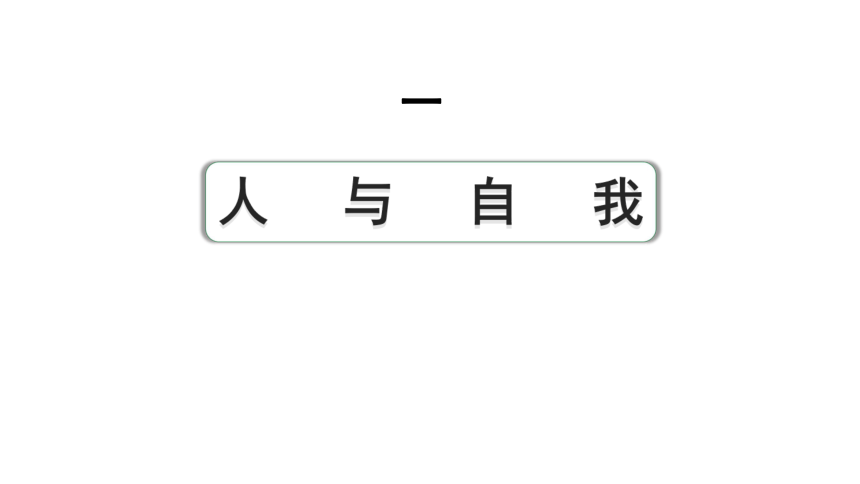 | |
| 格式 | pptx | ||
| 文件大小 | 636.1KB | ||
| 资源类型 | 教案 | ||
| 版本资源 | 通用版 | ||
| 科目 | 英语 | ||
| 更新时间 | 2023-12-22 22:38:49 | ||
图片预览

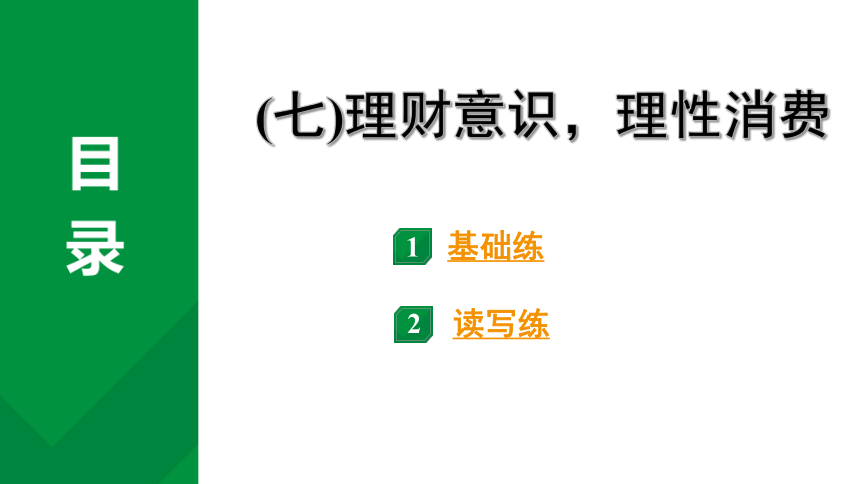
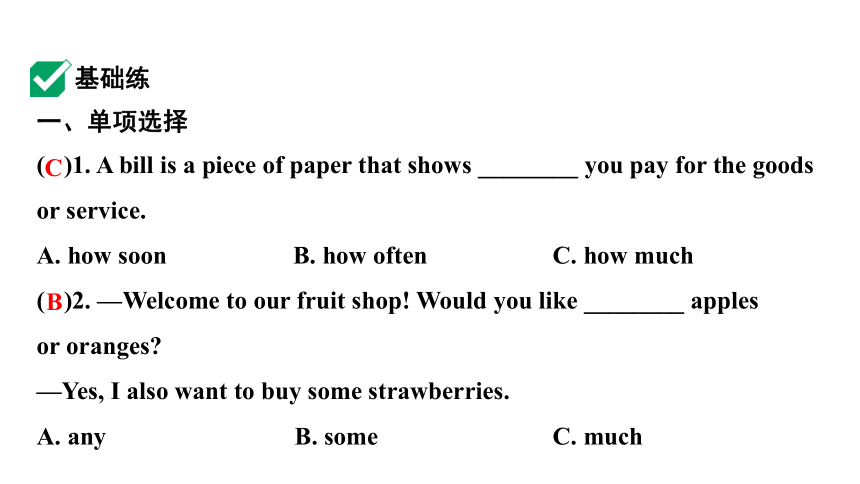
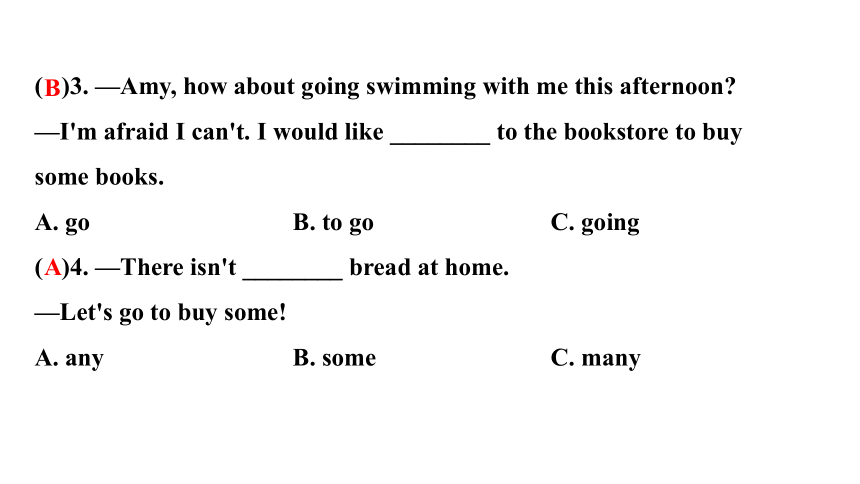
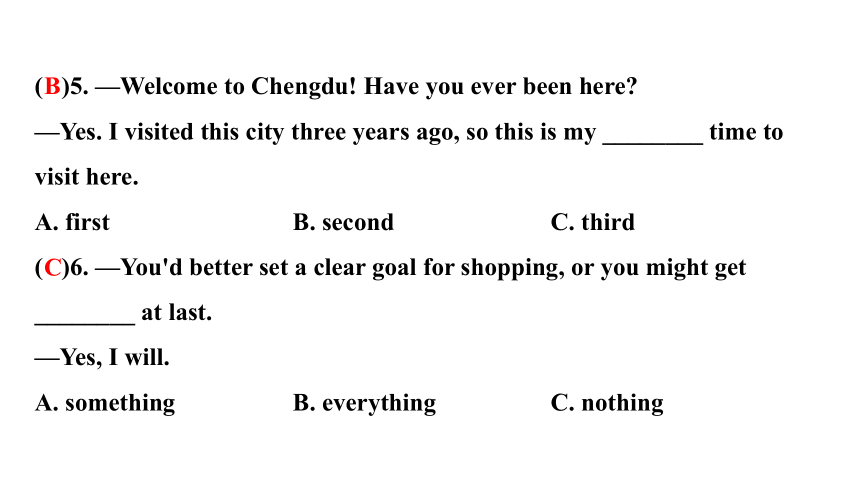
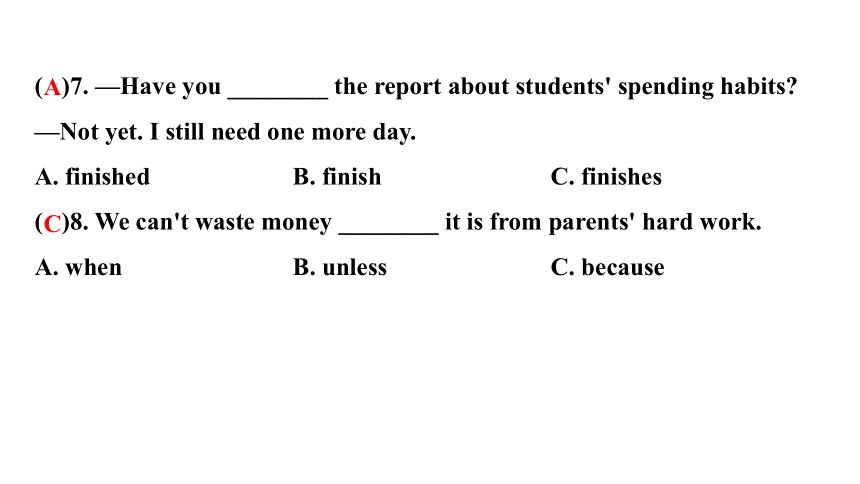
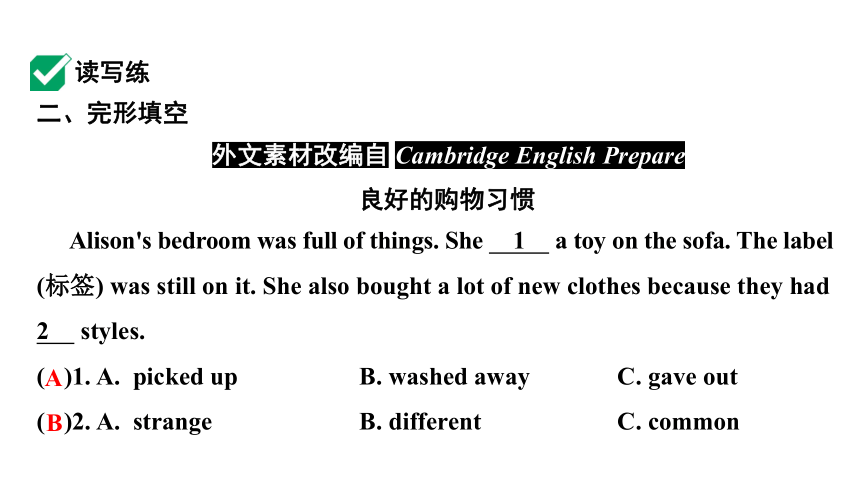

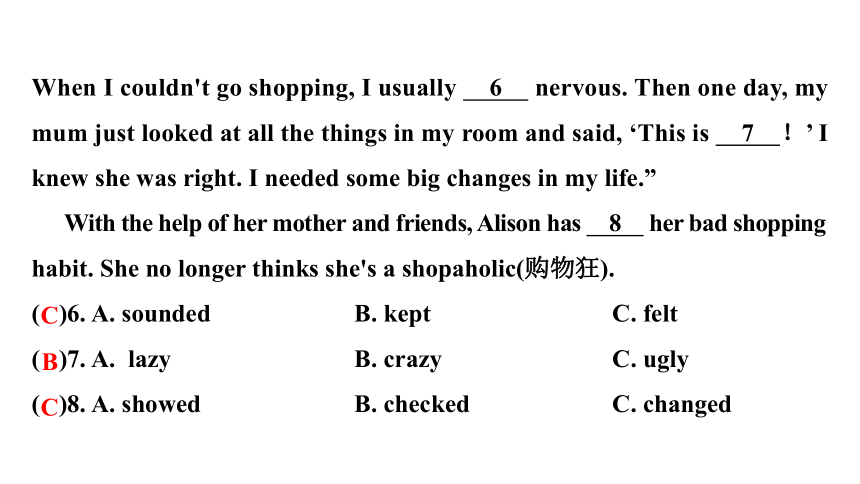
文档简介
(共29张PPT)
人与自我
一
(七)理财意识,理性消费
1
基础练
读写练
2
基础练
一、单项选择
( )1. A bill is a piece of paper that shows ________ you pay for the goods or service.
A. how soon B. how often C. how much
( )2. —Welcome to our fruit shop! Would you like ________ apples or oranges
—Yes, I also want to buy some strawberries.
A. any B. some C. much
C
B
( )3. —Amy, how about going swimming with me this afternoon
—I'm afraid I can't. I would like ________ to the bookstore to buy some books.
A. go B. to go C. going
( )4. —There isn't ________ bread at home.
—Let's go to buy some!
A. any B. some C. many
B
A
( )5. —Welcome to Chengdu! Have you ever been here
—Yes. I visited this city three years ago, so this is my ________ time to visit here.
A. first B. second C. third
( )6. —You'd better set a clear goal for shopping, or you might get ________ at last.
—Yes, I will.
A. something B. everything C. nothing
B
C
( )7. —Have you ________ the report about students' spending habits
—Not yet. I still need one more day.
A. finished B. finish C. finishes
( )8. We can't waste money ________ it is from parents' hard work.
A. when B. unless C. because
A
C
读写练
二、完形填空
Alison's bedroom was full of things. She 1 a toy on the sofa. The label (标签) was still on it. She also bought a lot of new clothes because they had 2 styles.
( )1. A. picked up B. washed away C. gave out
( )2. A. strange B. different C. common
外文素材改编自 Cambridge English Prepare
良好的购物习惯
A
B
What's more, she has bought hundreds of other 3 things—like 20 new covers for her phone. She hasn't used any of them!
Alison knew she had a 4 . “I often bought something every day. Usually it was something small, but I just wanted to buy it,” she said. “I spent money that I got from my birthday. I 5 some from friends or my parents when I was short of money.
( )3. A. natural B. similar C. small
( )4. A. chance B. challenge C. problem
( )5. A. accepted B. borrowed C. brought
B
B
C
When I couldn't go shopping, I usually 6 nervous. Then one day, my mum just looked at all the things in my room and said, ‘This is 7 !’ I knew she was right. I needed some big changes in my life.”
With the help of her mother and friends, Alison has 8 her bad shopping habit. She no longer thinks she's a shopaholic(购物狂).
( )6. A. sounded B. kept C. felt
( )7. A. lazy B. crazy C. ugly
( )8. A. showed B. checked C. changed
B
C
C
“When I want to buy something in a shop, I ask myself two questions,” she said. “Do I need it Can I 9 it The answer to both questions is usually ‘no’,so I walk away 10 . It's great!”
( )9. A. afford B. improve C. collect
( )10. A. luckily B. quickly C. angrily
B
A
语篇研读
What:讲述了购物狂Alison改变自己购物习惯的故事。
Why:引导学生树立理性消费的意识。
How:①文体特征:记叙文。
②故事线:Alison的卧室里堆满了各种物品→Alison意识到自己购物成瘾的问题并开始寻求帮助→Alison学会控制自己购物欲望的方法。
③写作手法:文章在开始创设真实情境,介绍了Alison的购物习惯,使读者更直观地了解她的消费习惯。
“完形填空”给我们讲述了Alison是如何改变自己的购物习惯并建立正确的理财意识的故事。你的购物习惯是怎样的?请和我们分享一下。词数50左右。
After reading Alison's story, I learned a lot. For example, I usually make a shopping list before going shopping. To keep my shopping list working well, I often write down everything I want on the paper at first. The paper can help me to remember things better and more easily.
All in all, no matter what way you are trying, being sure to remember everything you need is necessary.
微写作 读后感
三、 判断型阅读理解(2023定心卷)
How do you manage your money
Grade: 9 Name: Eileen
Quick Questions:
[语篇类型·调查问卷]
A stands for “agree”, B stands for “not sure”, C stands for “disagree”.
Assessments(评价)
Mostly “A” answers:
You're already careful with money and realize the importance of managing money.
Mostly “B” answers:
You can pay attention to your money, but there are many useful skills to discover.
Mostly “C” answers:
You've got a way to go before you can manage your money well. But don't worry. You've just begun your journey.
语篇研读
What:介绍了Eileen的理财情况。
Why:引导学生正确地管理和使用自己的零花钱。
How:①文体特征:应用文——调查问卷。
②写作手法:文章以问卷的形式呈现,引起学生的阅读兴趣,同龄人的真实案例也增强了文章的说服力。
. .
( )1. The survey report is mainly designed for students.
( )2. Eileen sets a saving goal for herself.
( )3. Eileen gives her lucky money to her parents.
( )4. If Eileen sees a pair of shoes she really likes, she will buy them at once.
( )5. The survey results show that Eileen can carefully manage her money.
B
B
A
A
A
思维拓展
语篇研读
( )1. What does the underlined word “emergencies” probably mean
A. Loud noise. B. Everyday plans. C. Sudden events.
( )2. Where does this passage probably come from
A. History report. B. Educational magazine. C. Travel diary
C
B
解题有策略
词义猜测
考查学生根据上下文内容推测生词含义的能力。
解题对策如下:Step 1根据题干定位画线单词在文章中的位置并提取相关信息→文中第三个星号的句中提取“keep some money for”;Step 2将 信息与设题一一对应,猜测画线单词词义→根据句意可知,是为突发 情况准备钱;Step 3 结合选项,选出答案→对比选项可知C项正确。
文中在表达多关注你的金钱时这样表述:You can pay attention to your money, but there are many useful skills to discover.
亮点点拨:pay attention to...集中注意力于……,当后面跟动词时,需用动词 ing形式。
仿写:如果你一个人出去,你应该注意你的安全。
____________________________________________________________
读写积累
If you go out alone, you should pay attention to your safety.
四、 完成对话
A: Hi, Lewis. We have such a long summer holiday. How will you1. _____ it
B: I have a chance to work. I did a part time job in the 2. ________ of my school. I was responsible for sorting(分类) different kinds of books.
A: Wow. Sounds good. How much money can you get
B: Four hundred yuan each month.
外文素材改编自 Cambridge English Prepare
如何赚钱
spend
library
The pay is not high, but I can improve my living skills. And I can read books there. In my opinion, it's a good feeling to make my 3. ________ money.
A: Yes. It is not only satisfying, but you might also find you're more careful about spending your money. If you realize how hard it is to make money, you won't 4. ________ your money on buying useless things. And you will save a lot of money.
B: You're right. Well, you seem to have a better 5. ____________ of money.
A: Thank you for saying so.
own
waste
understanding
I'm just the one who practice thrift(节约) and 6. ___________________ spend money on useless things.
B: Great. How do you make it
A: So many things. For example, there are probably a number of things lying around your house that you don't really 7. ______________. Collect anything you haven't used for at least a year together and sell them.
B: Oh, I haven't done it before.
A: You may be 8. _________________ at how much money it is! You could make money every year by selling things.
never/seldom/hardly
need/use
surprised/amazed
B: How do you deal with the old things
A: My dad helps me 9. ________ lots of old books on an online website. I also deal with them by finding local buyers, so they can collect the books by themselves.
B: Thank you for your advice. I'll 10. ______________________________ these suggestions.
sell
follow/take/consider
语篇研读
What:谈论了学生如何赚钱的两种方式。
Why:帮助学生更好地学会理财,树立正确的金钱观。
How:①文体特征:日常对话。②写作手法:文章通过人物自身案例 加深学生对文章主题的理解。
五、补全短文(2023成都)
Money may not buy happiness, but it helps. Many teenagers want to learn how to manage money before going out into the world. 1.__________ This idea is raised by Dr. Mara Harvey, a money expert. The following are some of her tips.
A. Spend your money wisely.
B. Be smart with your money.
C. Set a goal of saving money.
D. Save your money in the long run.
E. Agree on the value of different jobs before you start.
F. Write down how much money you have and what you are spending.
B
Learn to make money. Ask parents or neighbors if you can do chores to make pocket money. These could include washing a car or taking the dog for a walk. 2.___ In this way, you can also improve your communication skills, which will help when you have a grown up job, too.
Help your money grow.
A. Spend your money wisely.
B. Be smart with your money.
C. Set a goal of saving money.
D. Save your money in the long run.
E. Agree on the value of different jobs before you start.
F. Write down how much money you have and what you are spending.
E
Money can't grow if it's sitting inside a piggy bank. Put your money in the bank and you can get interest(利息). 3._____ One day you may feel surprised at how much money you have.
Make a plan. If you have a big event, such as a holiday coming up, it might mean you will need to spend more of your pocket money.
A. Spend your money wisely.
B. Be smart with your money.
C. Set a goal of saving money.
D. Save your money in the long run.
E. Agree on the value of different jobs before you start.
F. Write down how much money you have and what you are spending.
D
Try making a plan for spending and saving. 4.________ Then it will help you take control of your money.
5.______ Figure out how much you can reasonably spend each month. Spend your money on what you truly need. Then try to cut down on spending. For example, rather than eating out, you can choose to cook at home.
A. Spend your money wisely.
B. Be smart with your money.
C. Set a goal of saving money.
D. Save your money in the long run.
E. Agree on the value of different jobs before you start.
F. Write down how much money you have and what you are spending.
A
F
人与自我
一
(七)理财意识,理性消费
1
基础练
读写练
2
基础练
一、单项选择
( )1. A bill is a piece of paper that shows ________ you pay for the goods or service.
A. how soon B. how often C. how much
( )2. —Welcome to our fruit shop! Would you like ________ apples or oranges
—Yes, I also want to buy some strawberries.
A. any B. some C. much
C
B
( )3. —Amy, how about going swimming with me this afternoon
—I'm afraid I can't. I would like ________ to the bookstore to buy some books.
A. go B. to go C. going
( )4. —There isn't ________ bread at home.
—Let's go to buy some!
A. any B. some C. many
B
A
( )5. —Welcome to Chengdu! Have you ever been here
—Yes. I visited this city three years ago, so this is my ________ time to visit here.
A. first B. second C. third
( )6. —You'd better set a clear goal for shopping, or you might get ________ at last.
—Yes, I will.
A. something B. everything C. nothing
B
C
( )7. —Have you ________ the report about students' spending habits
—Not yet. I still need one more day.
A. finished B. finish C. finishes
( )8. We can't waste money ________ it is from parents' hard work.
A. when B. unless C. because
A
C
读写练
二、完形填空
Alison's bedroom was full of things. She 1 a toy on the sofa. The label (标签) was still on it. She also bought a lot of new clothes because they had 2 styles.
( )1. A. picked up B. washed away C. gave out
( )2. A. strange B. different C. common
外文素材改编自 Cambridge English Prepare
良好的购物习惯
A
B
What's more, she has bought hundreds of other 3 things—like 20 new covers for her phone. She hasn't used any of them!
Alison knew she had a 4 . “I often bought something every day. Usually it was something small, but I just wanted to buy it,” she said. “I spent money that I got from my birthday. I 5 some from friends or my parents when I was short of money.
( )3. A. natural B. similar C. small
( )4. A. chance B. challenge C. problem
( )5. A. accepted B. borrowed C. brought
B
B
C
When I couldn't go shopping, I usually 6 nervous. Then one day, my mum just looked at all the things in my room and said, ‘This is 7 !’ I knew she was right. I needed some big changes in my life.”
With the help of her mother and friends, Alison has 8 her bad shopping habit. She no longer thinks she's a shopaholic(购物狂).
( )6. A. sounded B. kept C. felt
( )7. A. lazy B. crazy C. ugly
( )8. A. showed B. checked C. changed
B
C
C
“When I want to buy something in a shop, I ask myself two questions,” she said. “Do I need it Can I 9 it The answer to both questions is usually ‘no’,so I walk away 10 . It's great!”
( )9. A. afford B. improve C. collect
( )10. A. luckily B. quickly C. angrily
B
A
语篇研读
What:讲述了购物狂Alison改变自己购物习惯的故事。
Why:引导学生树立理性消费的意识。
How:①文体特征:记叙文。
②故事线:Alison的卧室里堆满了各种物品→Alison意识到自己购物成瘾的问题并开始寻求帮助→Alison学会控制自己购物欲望的方法。
③写作手法:文章在开始创设真实情境,介绍了Alison的购物习惯,使读者更直观地了解她的消费习惯。
“完形填空”给我们讲述了Alison是如何改变自己的购物习惯并建立正确的理财意识的故事。你的购物习惯是怎样的?请和我们分享一下。词数50左右。
After reading Alison's story, I learned a lot. For example, I usually make a shopping list before going shopping. To keep my shopping list working well, I often write down everything I want on the paper at first. The paper can help me to remember things better and more easily.
All in all, no matter what way you are trying, being sure to remember everything you need is necessary.
微写作 读后感
三、 判断型阅读理解(2023定心卷)
How do you manage your money
Grade: 9 Name: Eileen
Quick Questions:
[语篇类型·调查问卷]
A stands for “agree”, B stands for “not sure”, C stands for “disagree”.
Assessments(评价)
Mostly “A” answers:
You're already careful with money and realize the importance of managing money.
Mostly “B” answers:
You can pay attention to your money, but there are many useful skills to discover.
Mostly “C” answers:
You've got a way to go before you can manage your money well. But don't worry. You've just begun your journey.
语篇研读
What:介绍了Eileen的理财情况。
Why:引导学生正确地管理和使用自己的零花钱。
How:①文体特征:应用文——调查问卷。
②写作手法:文章以问卷的形式呈现,引起学生的阅读兴趣,同龄人的真实案例也增强了文章的说服力。
. .
( )1. The survey report is mainly designed for students.
( )2. Eileen sets a saving goal for herself.
( )3. Eileen gives her lucky money to her parents.
( )4. If Eileen sees a pair of shoes she really likes, she will buy them at once.
( )5. The survey results show that Eileen can carefully manage her money.
B
B
A
A
A
思维拓展
语篇研读
( )1. What does the underlined word “emergencies” probably mean
A. Loud noise. B. Everyday plans. C. Sudden events.
( )2. Where does this passage probably come from
A. History report. B. Educational magazine. C. Travel diary
C
B
解题有策略
词义猜测
考查学生根据上下文内容推测生词含义的能力。
解题对策如下:Step 1根据题干定位画线单词在文章中的位置并提取相关信息→文中第三个星号的句中提取“keep some money for”;Step 2将 信息与设题一一对应,猜测画线单词词义→根据句意可知,是为突发 情况准备钱;Step 3 结合选项,选出答案→对比选项可知C项正确。
文中在表达多关注你的金钱时这样表述:You can pay attention to your money, but there are many useful skills to discover.
亮点点拨:pay attention to...集中注意力于……,当后面跟动词时,需用动词 ing形式。
仿写:如果你一个人出去,你应该注意你的安全。
____________________________________________________________
读写积累
If you go out alone, you should pay attention to your safety.
四、 完成对话
A: Hi, Lewis. We have such a long summer holiday. How will you1. _____ it
B: I have a chance to work. I did a part time job in the 2. ________ of my school. I was responsible for sorting(分类) different kinds of books.
A: Wow. Sounds good. How much money can you get
B: Four hundred yuan each month.
外文素材改编自 Cambridge English Prepare
如何赚钱
spend
library
The pay is not high, but I can improve my living skills. And I can read books there. In my opinion, it's a good feeling to make my 3. ________ money.
A: Yes. It is not only satisfying, but you might also find you're more careful about spending your money. If you realize how hard it is to make money, you won't 4. ________ your money on buying useless things. And you will save a lot of money.
B: You're right. Well, you seem to have a better 5. ____________ of money.
A: Thank you for saying so.
own
waste
understanding
I'm just the one who practice thrift(节约) and 6. ___________________ spend money on useless things.
B: Great. How do you make it
A: So many things. For example, there are probably a number of things lying around your house that you don't really 7. ______________. Collect anything you haven't used for at least a year together and sell them.
B: Oh, I haven't done it before.
A: You may be 8. _________________ at how much money it is! You could make money every year by selling things.
never/seldom/hardly
need/use
surprised/amazed
B: How do you deal with the old things
A: My dad helps me 9. ________ lots of old books on an online website. I also deal with them by finding local buyers, so they can collect the books by themselves.
B: Thank you for your advice. I'll 10. ______________________________ these suggestions.
sell
follow/take/consider
语篇研读
What:谈论了学生如何赚钱的两种方式。
Why:帮助学生更好地学会理财,树立正确的金钱观。
How:①文体特征:日常对话。②写作手法:文章通过人物自身案例 加深学生对文章主题的理解。
五、补全短文(2023成都)
Money may not buy happiness, but it helps. Many teenagers want to learn how to manage money before going out into the world. 1.__________ This idea is raised by Dr. Mara Harvey, a money expert. The following are some of her tips.
A. Spend your money wisely.
B. Be smart with your money.
C. Set a goal of saving money.
D. Save your money in the long run.
E. Agree on the value of different jobs before you start.
F. Write down how much money you have and what you are spending.
B
Learn to make money. Ask parents or neighbors if you can do chores to make pocket money. These could include washing a car or taking the dog for a walk. 2.___ In this way, you can also improve your communication skills, which will help when you have a grown up job, too.
Help your money grow.
A. Spend your money wisely.
B. Be smart with your money.
C. Set a goal of saving money.
D. Save your money in the long run.
E. Agree on the value of different jobs before you start.
F. Write down how much money you have and what you are spending.
E
Money can't grow if it's sitting inside a piggy bank. Put your money in the bank and you can get interest(利息). 3._____ One day you may feel surprised at how much money you have.
Make a plan. If you have a big event, such as a holiday coming up, it might mean you will need to spend more of your pocket money.
A. Spend your money wisely.
B. Be smart with your money.
C. Set a goal of saving money.
D. Save your money in the long run.
E. Agree on the value of different jobs before you start.
F. Write down how much money you have and what you are spending.
D
Try making a plan for spending and saving. 4.________ Then it will help you take control of your money.
5.______ Figure out how much you can reasonably spend each month. Spend your money on what you truly need. Then try to cut down on spending. For example, rather than eating out, you can choose to cook at home.
A. Spend your money wisely.
B. Be smart with your money.
C. Set a goal of saving money.
D. Save your money in the long run.
E. Agree on the value of different jobs before you start.
F. Write down how much money you have and what you are spending.
A
F
同课章节目录
